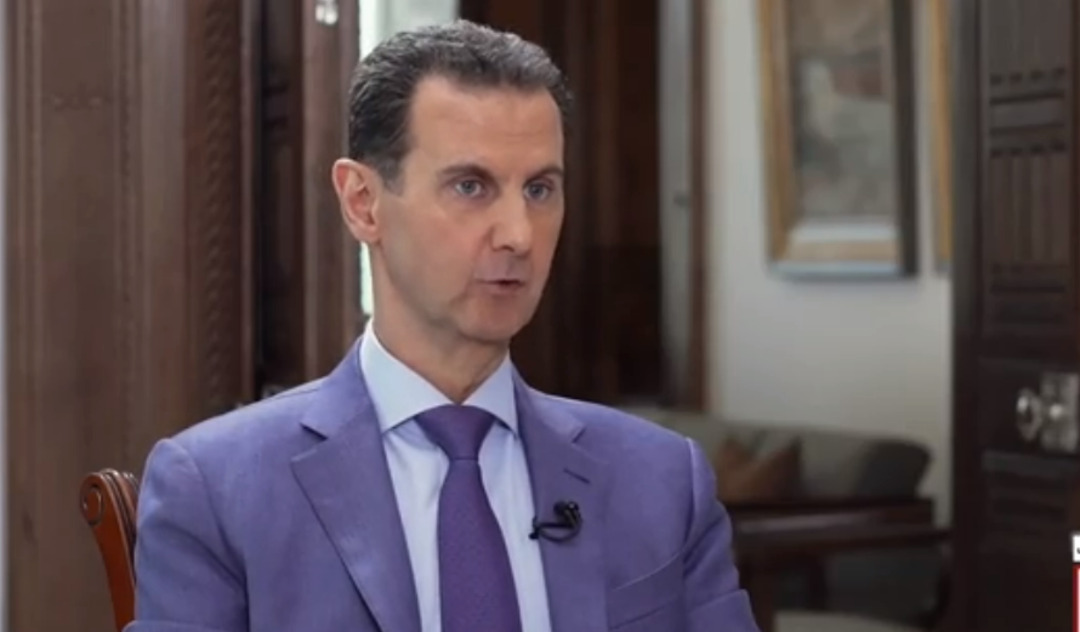-
Assad Affirms: Escalation in Syria Aims to Divide the Region and Redraw Borders

Syrian President Bashar Assad held a phone conversation with his Iranian counterpart, Masoud Barzani, during which they discussed the ongoing terrorist escalation in Syria, viewed as an attempt to divide the Middle East and redraw borders according to Western interests.
According to the official statement published by the Syrian presidency on its Telegram platform, Assad confirmed that the current escalation reflects distant goals aimed at fragmenting the countries in the region. He pointed out that these moves are merely attempts to dismantle states and reshape borders according to the interests of the United States and the West.
For his part, Iranian President Masoud Barzani expressed his country's firm rejection of any attempts to undermine Syria's unity and stability, stating that any aggression against Syrian territorial integrity poses a threat to the stability of the entire region. He affirmed Iran's readiness to provide all forms of support to Syria in facing these challenges.
These discussions follow the confirmation from the Iranian Foreign Ministry of its support for the Syrian government, with Foreign Ministry spokesperson Ismail Baqaei stating in a press conference that the presence of Iranian military advisors will continue at the request of Damascus.
Baqaei also noted that Israel is the primary beneficiary of the insecurity in Syria and the region, explaining that the reactivation of terrorist groups immediately after the announcement of a ceasefire in Lebanon is not a coincidental incident, but rather the result of a long history of questionable relations between those groups and Israel since 2011 and 2012.
In a related context, "Hay'at Tahrir al-Sham," formerly known as al-Nusra Front, confirmed that it launched an unprecedented surprise attack on the city of Aleppo in cooperation with other armed factions, managing to fully seize control of the city yesterday, along with dozens of villages in Hama and the Idlib countryside.
Tags
You May Also Like
Popular Posts
Caricature
BENEFIT Sponsors BuildHer...
- April 23, 2025
BENEFIT, the Kingdom’s innovator and leading company in Fintech and electronic financial transactions service, has sponsored the BuildHer CityHack 2025 Hackathon, a two-day event spearheaded by the College of Engineering and Technology at the Royal University for Women (RUW).
Aimed at secondary school students, the event brought together a distinguished group of academic professionals and technology experts to mentor and inspire young participants.
More than 100 high school students from across the Kingdom of Bahrain took part in the hackathon, which featured an intensive programme of training workshops and hands-on sessions. These activities were tailored to enhance participants’ critical thinking, collaborative problem-solving, and team-building capabilities, while also encouraging the development of practical and sustainable solutions to contemporary challenges using modern technological tools.
BENEFIT’s Chief Executive Mr. Abdulwahed AlJanahi, commented: “Our support for this educational hackathon reflects our long-term strategic vision to nurture the talents of emerging national youth and empower the next generation of accomplished female leaders in technology. By fostering creativity and innovation, we aim to contribute meaningfully to Bahrain’s comprehensive development goals and align with the aspirations outlined in the Kingdom’s Vision 2030—an ambition in which BENEFIT plays a central role.”
Professor Riyadh Yousif Hamzah, President of the Royal University for Women, commented: “This initiative reflects our commitment to advancing women in STEM fields. We're cultivating a generation of creative, solution-driven female leaders who will drive national development. Our partnership with BENEFIT exemplifies the powerful synergy between academia and private sector in supporting educational innovation.”
Hanan Abdulla Hasan, Senior Manager, PR & Communication at BENEFIT, said: “We are honoured to collaborate with RUW in supporting this remarkable technology-focused event. It highlights our commitment to social responsibility, and our ongoing efforts to enhance the digital and innovation capabilities of young Bahraini women and foster their ability to harness technological tools in the service of a smarter, more sustainable future.”
For his part, Dr. Humam ElAgha, Acting Dean of the College of Engineering and Technology at the University, said: “BuildHer CityHack 2025 embodies our hands-on approach to education. By tackling real-world problems through creative thinking and sustainable solutions, we're preparing women to thrive in the knowledge economy – a cornerstone of the University's vision.”
opinion
Report
ads
Newsletter
Subscribe to our mailing list to get the new updates!






















